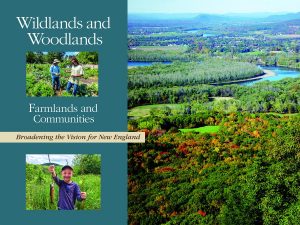Wildlands & Woodlands (W&W) is a vision for the future of the New England landscape that has become an initiative of partners of many stripes and missions who value land conservation as an essential tool for improving the health and well-being of nature and society.
The W&W vision has evolved to embrace a broader landscape and more diverse communities, including farms and urban and suburban landscapes. The Wildlands and Woodlands, Farmlands & Communities (W&WF&C) vision was unveiled in 2017.
Goals for New England
Wildlands and Woodlands, Farmlands and Communities: Broadening the Vision for New England, published in 2017, outlines clear, ambitious goals for permanent land protection in New England. We regularly measure our progress toward these goals, but recognize that their impact extends beyond simple statistics.
By 2060, the Wildlands & Woodlands vision calls for:
- Conserving 70% of the region as forests
- Protecting 7% as farmland
Highstead partners with the Harvard Forest at Harvard University to lead the W&W initiative along with a dynamic group of academic, conservation, and community leaders.
David R. Foster“Care and protection of the land is an essential means towards a greater set of societal, political, and environmental goals.”
At Highstead, we are committed to advancing the W&WF&C vision because we share the belief that thoughtful, intentional conservation of our land and waters is essential to a healthier, more livable and enduring world.
From the projects we pursue and the partnerships we nurture to the way we manage our own land in Redding, Connecticut, W&W guides the way. Over the years, our work has increasingly rippled outward as we share our vision and model for collaborative conservation with our friends and colleagues nationally and internationally.
More than ever, the interconnectedness and interdependence of life on earth are abundantly evident. We are called to steward and protect our land today so that it is here for us tomorrow.
Join the W&W movement—partner with us to help advance land conservation initiatives, become part of the Regional Conservation Partnership Network, or support your local land trust or conservation organization.
